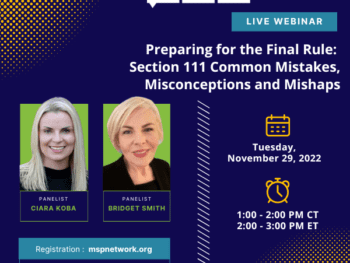
It All Starts with Social Security Disability
The Social Security Disability (SSDI) program was enacted in 1965 as part of President Johnson’s Great Society program and reforms. The rationale for the program was to provide short-term disability insurance payments for the millions of Americans who could not work due to an injury or underlying medical program. This program is funded by payroll taxes and administered by the Social Security Administration. Applicants seeking benefits must prove a disability that prevents them from gaining substantial employment.
Click Link to Access Free PDF Download
“8 ‘Think Outside the Box’ Tactics to Settle Workers’ Comp Claims”
It is common in workers’ compensation claims for an induvial to apply for these benefits whether their claim is admitted or denied. Once someone receives benefits under this program, they become a Medicare beneficiary two years after their determined “date of the disability.” This requires an analysis in terms of eligibility by all interested stakeholders early on in the in-take phase of a claim:
- Review of the injured employee’s regarding their current SSDI status;
- Inquiry into the likelihood the injured employee will apply for SSDI benefits if they currently are not a recipient; and
- Collection of information regarding the established “date of disability” should the injured employee qualify.
Receipt of SSDI benefits is a crucial indicator of whether the employee will become eligible to receive Medicare benefits. This drives the need to review a file related to Medicare Secondary Payer compliance and the challenges this presents when settling the claim.
And Medicare!
Once an injured employee becomes a Medicare beneficiary, the claim handler, defense attorney, and employer representative need to work together to ensure the interests of Medicare are considered in any settlement. Medicare entitlement creates several issues to consider:
- Closure of Future Medicals: Settlements that close out future Medicare “items and services” (medical care) shift the burden onto Medicare. The Medicare Secondary Payer Act requires Medicare’s interest to be considered. If parties do not want to include a Medicare Set-aside in their settlement, they can only close indemnity benefits, with future medical benefits remaining open. Other options include closing out those items and services not covered by Medicare.
- MSA Submission Process: When moving forward with a Medicare Set-aside, there needs to be a discussion as to whether it will be submitted under the voluntary review and approval process. Barriers to submission include the willingness of the employee to agree to it, Medicare-imposed workload review thresholds, or the parties’ needs when time is of the essence.
- Other Issues for Consideration: There are several other issues regarding Medicare Set-asides. These include the funding mechanisms (lump sum or annuity) for self- or professional administration. These are items that can be used as add-ins when negotiating a settlement. Offering these items can add value to an offer and help bridge the gap.
While Medicare entitlement creates many barriers, it is vital to recognize its value as a tool to resolve a claim and the many opportunities various considerations can bring when attempting to resolve a claim.
And Medicaid!
The Medicaid program was created in 1965 with Social Security Disability and Medicare. It is crucial to remember it is not the same. Medicaid is a “means-tested” insurance program for lower-income individuals. Many states expanded coverage options following the passage of the Affordable Care Act. It is critical to remember the following when inquiring about an injured employee:
- Never use the terms “Medicare” and “Medicaid” interchangeably. Medicaid programs are subject to federal minimum standards, with each state offering more generous benefit options. State agencies administer these programs.
- Employees can be dual eligible – receiving Medicare and Medicaid benefits simultaneously. Authorizations can be used to determine what specific programs an employee is receiving.
- Settling a workers’ compensation claim can disqualify an individual from future Medicaid entitlement. Parties may want to consider using a special needs trust to bridge the gap toward settlement.
Formal and informal discovery tools can determine an employee’s eligibility for all government programs. All stakeholders must cooperate when seeking this information.
Conclusions – Oh My!
Federal government benefits can cause issues when settling workers’ compensation claims. Members of the claim management team need to work in close coordination with other interested stakeholders to determine what benefits an employee is receiving and understand how it will impact the claim. Receipt of these benefits should not be seen as a barrier to settlement but as an opportunity to be creative when resolving a claim and ensuring each agency is appropriately considered.

Contact: mstack@reduceyourworkerscomp.com.
Workers’ Comp Roundup Blog: http://blog.reduceyourworkerscomp.com/
©2022 Amaxx LLC. All rights reserved under International Copyright Law.
Do not use this information without independent verification. All state laws vary. You should consult with your insurance broker, attorney, or qualified professional.


























